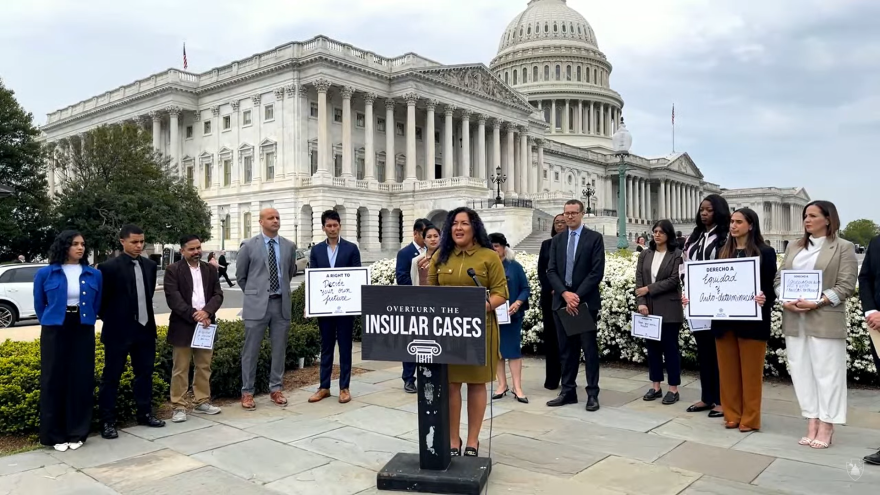ST. CROIX — Delegate to Congress Stacey Plaskett, civil rights groups and other allies held a press conference today outside the United States Capitol to call on the U.S. Department of Justice to disavow and cease its reliance on the egregiously racist Supreme Court decisions known as the Insular Cases that broke from prior precedent to justify the second-class treatment of citizens living in U.S. territories.
The Insular Cases, a series of controversial Supreme Court decisions from 1901 to 1922 that established a colonial framework for the 3.6 million residents of U.S. territories, included discriminatory language and helped ensure that people in U.S. territories would not have the same rights as other Americans.
Plaskett and other members of Congress, including more than 40 House representatives and senators, issued a letter on Monday to Attorney General Merrick Garland expressing deep concerns with the Justice Department’s continued reliance on and defense of the Insular Cases. Plaskett led the congressional letter along with Rep. Raúl Grijalva (D-Ariz), ranking member of the House Natural Resources Committee.
Plaskett subsequently called for the DOJ to condemn the Insular Cases during today’s press conference, which was streamed live on the Facebook and YouTube pages of the House Committee on Natural Resources: Democrats.
“It’s a central principle of our American democracy that Americans through their votes can have a say in their government,” she said while speaking from a podium outside the Capitol Building. “And yet there are 3.6 million people who reside in one of the five U.S. territories — American Samoa, Guam, the Northern Marianas, Puerto Rico, and the Virgin Islands of the United States — who are denied their full constitutional rights and have been structurally disenfranchised for over 125 years.”
Pamela Colon, a Virgin Islands attorney who serves as the first chair of the first advisory committee to the U.S. Commission on Civil Rights from the Virgin Islands, spoke during the press conference. She said she was “hopeful” because after 60 years of the existence of the Civil Rights Commission, the five U.S. territories have finally been asked to join the rest of the United States in reporting to the commission on civil rights issues affecting the territories. She will be presenting the USVI Advisory Committee’s inaugural report to the commission at 10 a.m. Friday. It will be streamed live on the commission’s YouTube page.
“The letter that brings us here today also adds to my hopefulness,” Colon said. “The Insular Cases are the foundation upon which the United States’ system of apartheid is imposed on its U.S. citizens, 3.6 million of us, living in U.S. soil in our territories. This foundation is starting to have cracks.”

In 2024, Plaskett said no federal judges should use the racist languages from the Insular Cases to deny citizenship rights to people born in U.S. territories, or to individuals who decide to reside in U.S. territories. She said President Joe Biden has made fighting for residents in the Virgin Islands and other territories a priority, noting he has spoken out against the denial of federal benefits in the territories.
“In 2021, he declared there can be no second-class citizen in the United States of America,” she said. Yet, his own Justice Department and its leadership continue to rely on the Insular Cases to argue that people in those territories have no right to full U.S. citizenship, that citizenship in U.S. territories is a mere privilege for Congress to extend or retract at their whim.”
Plaskett said there has been a bipartisan group of elected officials and former judges from U.S. territories who are all calling on the DOJ to not just turn, but to rip the page on the Insular Cases.
“If we’re serious about confronting systemic racism and fighting for equality of all Americans as the president has promised, then this administration must condemn the Insular Cases and the Justice Department should call on the Supreme Court to finally reckon with this legacy,” Plaskett said.
The federal lawmakers wrote in the letter to Garland that the Insular Cases broke from the anti-colonial values of the nation’s founding to hold that the “half-civilized,” “savage,” “alien races” living in Puerto Rico, Guam, and other U.S. territories were not entitled to the same constitutional rights and democratic participation afforded to people in the continental United States because they were “unfit” and could not understand “Anglo-Saxon principles.”
The federal lawmakers noted in the letter to Garland that a coalition of members of Congress previously wrote to him about this issue in 2021. Since then, they indicated that the DOJ has at times seemed to criticize the Insular Cases, while at others, it has actively relied upon and continued defending them. The lawmakers wrote that this “problematic dynamic” will likely continue repeating itself, absent the DOJ taking clear action to condemn the Insular Cases and their doctrine of territorial incorporation.
Teri Helenese, Governor Albert Bryan Jr.’s representative in Washington, D.C., while offering remarks during today’s press conference, said the Insular Cases label herself and her fellow residents of U.S. territories as second-class citizens.
“This distinction is not only disheartening but fundamentally houses the values of our nation,” she said. “Today, standing here as a dedicated advocate for equality, I shine the light on this critical issue that undermines the very fabric of this nation.”

Alejandro Ortiz, American Civil Liberties Union senior counsel for the Racial Justice Program, participated in the press conference along with Adi Martinez Roman and Neil Weare, co-directors of Right to Democracy, a nonprofit organization that is advancing democracy, equity, and self-determination in U.S. territories.
Ortiz said the Insular Cases, or “antiquated precedence,” are foundational to the United States’ discriminatory and colonial relationship with the territories and undermine the cause of racial justice and self-determination for the people living in them.
“The DOJ’s disavowal of them would be a small but meaningful step towards helping address this historical injustice,” Ortiz said.
Martinez, the Right to Democracy co-director, who was born and raised in Puerto Rico, said she has been working on self-determination issues for a long time, seeing the living effects of the colonial legal framework in the lives of people in Puerto Rico.
“We don’t want a generation more of people in the territories to go by without them having the opportunity to exercise their political rights and self-determination to really decide what their relationship with the United States should be like,” she said. “And this is not possible until the government of the United States recognizes that this legitimation of the colonial framework through the Insular Cases is a mistake, is something that should not be valid in constitutional law, and it should be repealed.”

Comments were made during the press conference on behalf of Grijalva, who also issued a statement.
“The Justice Department has made strides in the right direction by criticizing ‘aspects’ of the racist Insular Cases as ‘indefensible and repugnant,’” Grijalva said in a Right to Democracy press release. “But it is time for DOJ to go further and unequivocally reject these racist decisions, much as it has for other Supreme Court opinions that relied on racist stereotypes that do not abide by the Constitution’s command of equality and respect for rule of law.”
In recent weeks, the governor and Manuel Quilichini, Puerto Rico Bar Association president, also sent letters to the DOJ urging the department to condemn the Insular Cases.
“Virgin Islanders deserve to enjoy the full range of civil and political rights afforded by the U.S. Constitution,” Bryan said in a Right to Democracy press release.















